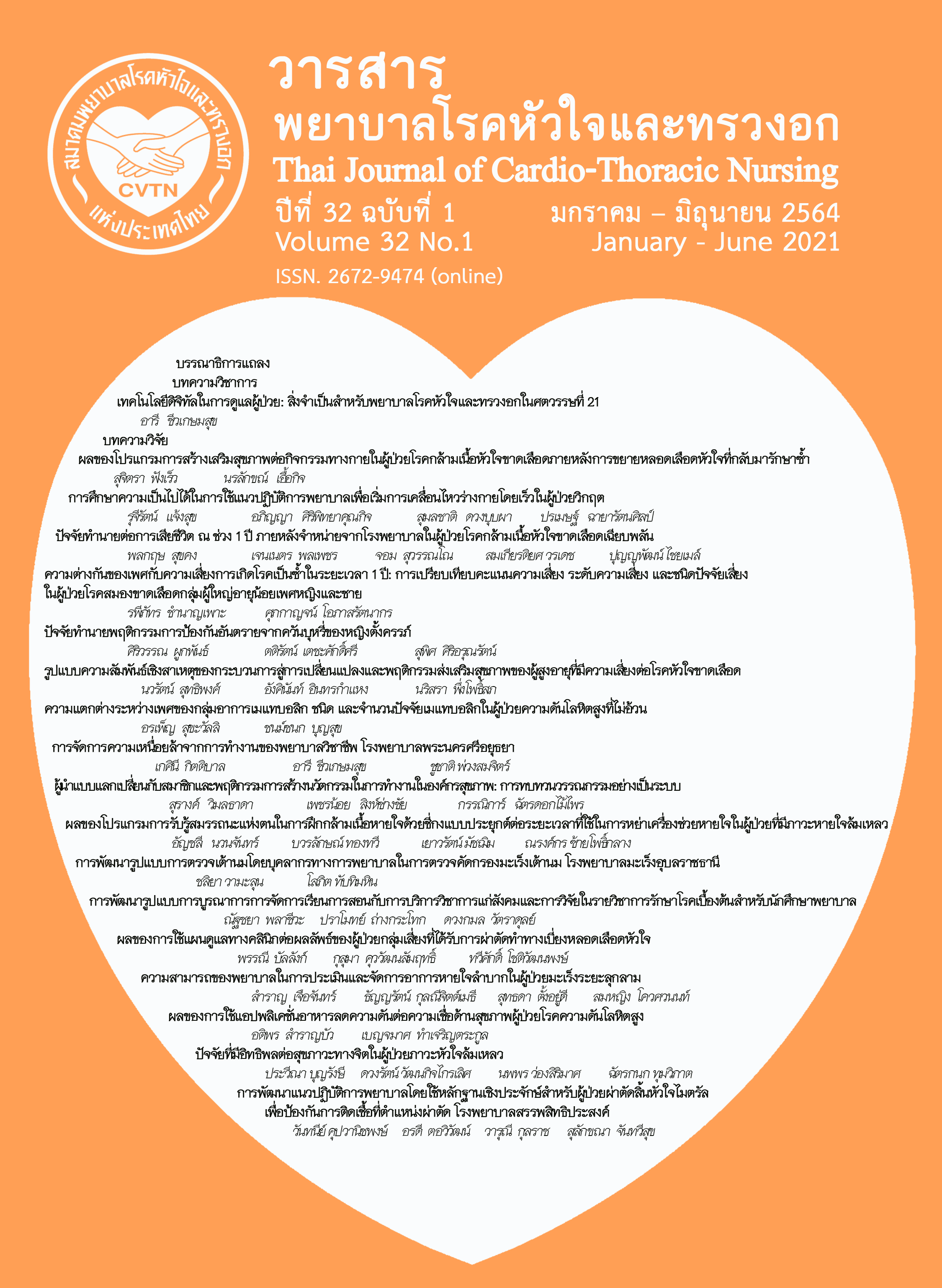ผลของโปรแกรมการรับรู้สมรรถนะแห่งตนในการฝึกกล้ามเนื้อหายใจ ด้วยชี่กงแบบประยุกต์ต่อระยะเวลาที่ใช้ในการหย่าเครื่องช่วยหายใจในผู้ป่วยที่มีภาวะหายใจล้มเหลว
คำสำคัญ:
การรับรู้สมรรถนะแห่งตน, ชี่กง, ภาวะหายใจล้มเหลว, ระยะเวลาที่ใช้ในการหย่าเครื่องช่วยหายใจบทคัดย่อ
การวิจัยกึ่งทดลองนี้ มีวัตถุประสงค์เพื่อศึกษาผลของโปรแกรมการรับรู้สมรรถนะแห่งตนในการฝึกกล้ามเนื้อหายใจด้วยชี่กงแบบประยุกต์ต่อระยะเวลาที่ใช้ในการหย่าเครื่องช่วยหายใจ กลุ่มตัวอย่างเป็นผู้ป่วยที่ใส่ท่อช่วยหายใจจากภาวะหายใจล้มเหลว จำนวน 60 ราย แบ่งเป็นกลุ่มควบคุม 30 ราย และกลุ่มทดลอง 30 ราย กลุ่มควบคุมได้รับการพยาบาลตามปกติ กลุ่มทดลองได้รับโปรแกรมการรับรู้สมรรถนะแห่งตนในการฝึกกล้ามเนื้อหายใจด้วยชี่กงแบบประยุกต์ เครื่องมือที่ใช้ในการเก็บรวบรวมข้อมูลประกอบด้วย 1) แบบสอบถามข้อมูลส่วนบุคคล 2) แบบประเมินความพร้อมในการหย่าเครื่องช่วยหายใจ และ 3) แบบบันทึกระยะเวลาและการหย่าเครื่องช่วยหายใจ วิเคราะห์ข้อมูลโดยใช้สถิติพรรณนา และการทดสอบทีแบบอิสระ
ผลการวิจัยพบว่า ภายหลังการเข้าโปรแกรมกลุ่มทดลองมีค่าเฉลี่ยของระยะเวลาที่ใช้ในการหย่าเครื่องช่วยหายใจ และค่าเฉลี่ยของระยะเวลาในการใช้เครื่องช่วยหายใจน้อยกว่ากลุ่มควบคุม อย่างมีนัยสำคัญทางสถิติ (P< .01)
ข้อเสนอแนะในการนำงานวิจัยไปใช้ บุคลากรทางสุขภาพที่ดูแลผู้ป่วยที่ใช้เครื่องช่วยหายใจ อาจพิจารณานำโปรแกรมนี้ไปใช้ในคลินิกเพื่อส่งเสริมความสำเร็จในการหย่าเครื่องช่วยหายใจ
เอกสารอ้างอิง
Withers A, Man TC, D'Cruz R, de Vries H, Fisser C, Ribeiro C, Shah N, Van Hollebecke M, Vosse BA, Heunks L, Patout M. Highlights from the respiratory failure and mechanical ventilation 2020 Conference. ERJ open research. 2021;7(1):1-13.
Li Y, Li H, Zhang D. Comparison of T-piece and pressure support ventilation as spontaneous breathing trials in critically ill patients: a systematic review and meta-analysis. Crit Care. 2020;24(1): 1-12.
Knebel A, Shekleton ME, Burns S, Clochesy JM, Hanneman SK. Weaning from mechanical ventilatory support: refinement of a model. Am J Crit Care. 1998;7(2):149-152.
Lacomis D. Neuromuscular disorders in critically ill patients: review and update. J Clin Neuromuscul Dis. 2011;12(4):197-218.
Zhou C, Wu L, Ni F, Ji W, Wu J, Zhang H. Critical illness polyneuropathy and myopathy: a systematic review. Neural Regen Res. 2014;9:101-10.
Wongsurakiat P. Update in internal medicine. Nonthaburi: Parbpim Printing; 2017. (in Thai).
Chaiweeradet M, Ua-Kit N, Oumtanee A. Experiences of beingan adult patient receiving mechanical ventilator. Songklanagarind Journal of Nursing 2013;33(3):31-46. (in Thai).
Pheugdee K, Jitpanya C. Factors related to sleep quality in mechanically ventilated patients: a sytematic review of literature. Journal of the Police Nurses 2016;8(2):23-33. (in Thai).
Wattanakitkrileart D, Pathomjaruvat T, Kedcham D.Factors predicting weaning success in patients with respiratory failure receiving invasive mechanical ventilator. Journal of Nursing Science 2013; 31(3):57-66. (in Thai).
Chow YW, Dorcas A, Siu AM. The effects of qigong on reducing stress and anxiety and enhancing body–mind well-being. Mindfulness 2012;3(1):51-59.
Tong H, Liu Y, Zhu Y, Zhang B, Hu J. The therapeutic effects of qigong in patients with chronic obstructive pulmonary disease in the stable stage: a meta-analysis. BMC Complement Altern Med. 2019;19(1):1-10.
Yang P. Healthy by Qigong: easy Guang-Im-Ju-Jai-Gomg. 7 th ed. Bangkok: Best graphic press; 2012. (in Thai).
Bandura A. Self-efficacy. In V. S. Ramachaudran (Ed.). Encyclopedia of human behavior. New York: Academic Press;1997, p. 71-81.
Nuanjan A. The duration of weaning from mechanical ventilator among patients with respiratory failure in general medicine unit: a preliminary study. Oral session presented at: The 1st Research day Faculty of Nursing Thammasat University. 2019 June 26; Pathum Thani.
Phasook K, Ua-Kit N. The effect of early mobilization program on duration of mechanical ventilation in critically ill medical patients. Thai Journal of Cardio-Thoracic Nursing 2015;26(1):57-72. (in Thai).
Polit DF, Beck CT. Nursing Research: principle and methods. Philadelphia: Lippincott Williams & Wilkins; 2012.
Vincent JL, Moreno R. Clinical review: scoring systems in the critically ill. Crit care. 2010;14(2):1-9
Burns SM, Fisher C, Tribble (Earven) SS, Lewis R, Merrel P, Conaway MR, et al. Multifaceter clinical score and outcome of mechanical ventilation weaning trail: Burns wean assessment program. Am J Crit Care. 2010;19:431-439.
Burns SM, Fahey SA, Barton DM, Slack D. Weaning from mechanical ventilation: a method for assessment and planning. AACN Clin Issues Crit Care Nurs. 1991;2(3):372-389.
Bhurayanontachai R, Chanbrahama C. Comparative study of the success rate of mechanical ventilator liberation between applying and not applying rapid shallow breathing index (rsbi) in patients with acute respiratory failure after passing clinical readiness assessment. Songklanagarind Journal of Nursing. 2016;34(4):153-161. (in Thai).
Pathomjaruwat T, Wattanakitkrileart D, Pinyopasakul W, Wongsurakiat P. Correlation between awareness of self performance, of disorder severity and of anxiety, and duration of spontaneous breathing trial in patients not having been weaned off respirators. Thai Journal of Nursing Council 2013;28(1):49-63. (in Thai).
Mingburee B. The effects of a weaning mechanical ventilator program with elastic band respiratory muscle training in patients with chronic obstructive pulmonary disease. [Master Thesis of Nursing Science]. Pathum Thani: Thammasat University; 2011. (in Thai).
McWilliams D, Weblin J, Atkins G, Bion J, Williams J, Elliott C, et al. Enhancing rehabilitation of mechanically ventilated patients in the intensive care unit: a quality improvement project. J Crit Care. 2015;30(1):13-18.
Jermrod P. Qigong for health care. Thai Red Cross Nursing Journal. 2017;10(1):44-54. (in Thai).
Suapone S. Effect of Chikong (Kung-Im-Jue-Jai-Kong) training on balance strength and vital capacity. [Dissertation of Sports and Exercise Science]. Bangkok: Srinakhainwirot University; 2011. (in Thai).
Hudson AL, Gandevia SC, Butler JE. A principle of neuromechanical matching for motor unit recruitment in human movement. Exerc Sport Sci Rev. 2019;47(3):157-168.
Roig M, O’Brien K, Kirk G, Murray R, McKinnon P, Shadgan B, et. al.The effect of eccentric versus concentric resistance training on muscle strength and mass in healthy adults: a systematic review with meta-analysis. Br J Sports Med. 2008;43:556-568.
Russo MA, Santarelli DM, O'Rourke D. The physiological effects of slow breathing in the healthy human. Breathe. 2017;13:298–309.
Zaccaro A, Piarulli A, Laurino M, Garbella E, Menicucci D, Neri B, et al. How breath-control can change your life: a systematic review on psycho-physiolgical correlates of slow breathing. Front Hum Neurosci. 2018;253(12):1-16.
Magalhaes AA, Oliveira L, Pereira MG, Menezes CB. Does meditation alter brain responses to negative stimuli? A systematic review. Front Hum Neurosci. 2018;13(12):448.
Jerath R, Bames V, Dillard-Wright D, Jerath S, Hamilton B. Dynamic change of awareness during meditation techniques:neural and physiological correlates. Front Hum Neurosci. 2012;131(6):1-4.
ดาวน์โหลด
เผยแพร่แล้ว
รูปแบบการอ้างอิง
ฉบับ
ประเภทบทความ
สัญญาอนุญาต
บทความนี้ยังไม่เคยตีพิมพ์หรืออยู่ในระหว่างส่งไปตีพิมพ์ในวารสารอื่น ๆ มาก่อน และกองบรรณาธิการขอสงวนสิทธิ์ในการตรวจทาน และแก้ไขต้นฉบับตามเกณฑ์ของวารสาร ในกรณีที่เรื่องของท่านได้ได้รับการตีพิมพ์ในวารสารฉบับนี้ถือว่าเป็น ลิขสิทธิ์ของวารสารพยาบาลโรคหัวใจและทรวงอก






